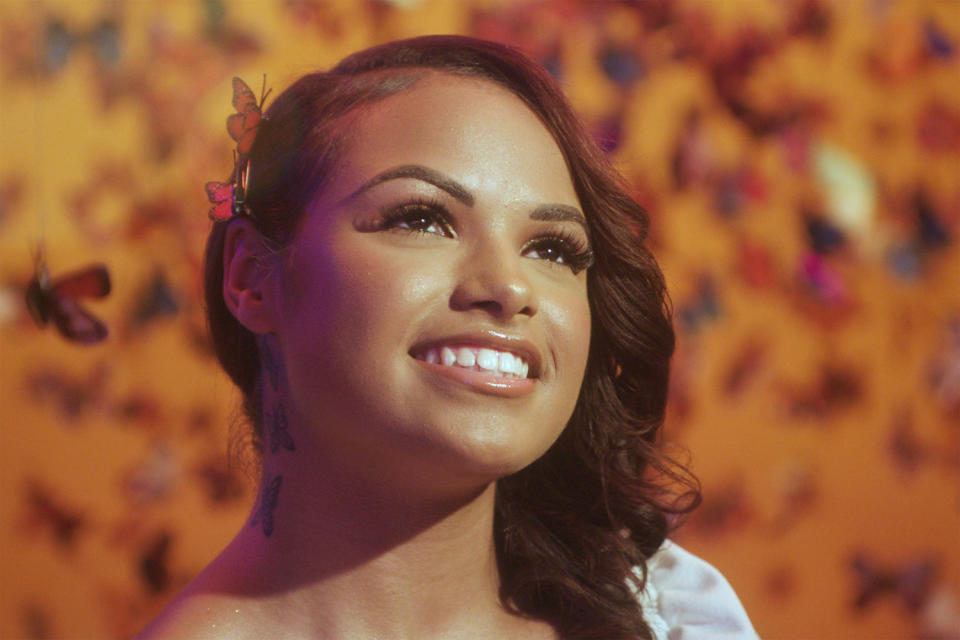Documentary shines a light on cotillions as a way to celebrate Black girlhood
Debutante balls have traditionally been associated with a particular kind of coming of age: that of teen girls who are well-to-do and, for the most part, white. A newly revived Black debutante ball in Canton, Ohio, uses the cotillion experience as programming for Black girls, many of whom live below the poverty line.
“The Debutantes,” which premiered this summer at the Tribeca Film Festival, presents three young “debs” — Teylar Bradley, Amelia Boles and Dedra Robbins — as they grapple with what it means for them to come of age and mark that transition.
Director Contessa Gayles wanted the documentary to celebrate Black girlhood before it slips away. For these debutantes in training — who reflect on the pressure of paying bills, familial tensions and discovering themselves in a world where they feel judged — that transition appears to come all too soon.
“I know a lot of times Black girls in particular are adultified at a young age,” Gayles said in an interview. “It kind of doesn’t allow us the opportunity to live fully in our girlhood and then to make that transition, and then have that transition be celebrated.”
The documentary was co-produced by NBC News Studios, which, along with NBC News, is owned by Comcast.
The young women of the 2022 Stark County Debutante Cotillion were the first group in decades to take part in the rite of passage ceremony after Black women in Canton began holding cotillions in the 1970s.

Gayles used traditional documentary vérité, archival footage and video blogs that the debutantes themselves filmed to capture the girls’ experience being presented to society. These personal videos, of the girls driving to work or dancing with friends, were part of allowing them to have control over their own narrative, Gayles said.
Gayles also created scenes of the debutantes posed on sets that reflected their inner worlds and dreams — with Boles as a pageant queen waving to crowds in a parade, Robbins in a garden of butterflies, and Bradley filmed through the lens of a refracted kaleidoscope. These “dreamscape worlds,” as Gayles described them, serve as the backdrop in the film for the debutantes’ existential contemplations of what it means to be a Black girl and a Black woman.
In “The Debutantes,” Gayles said she incorporated archival footage to stage an “intergenerational dialogue between the older generation and the current generation of Gen Z girls.”
As the film opens, black-and-white archival footage rolls of young Black girls in the 1970s, curtseying before society. In the background, a clip of Toni Morrison’s 2004 commencement speech at Wellesley College announces the girls’ coming of age. “There is nothing, believe me, more satisfying, more gratifying than true adulthood,” she says. “The adulthood that is the span of life before you.” The earnest moment is punctuated by a video of the girls joyfully doing a TikTok dance.
In a community where the tradition of debutante balls skipped a generation, Gayles said the girls’ lack of familiarity with cotillion allowed them to decide what parts of the traditionally exclusionary experience served them and what parts challenged their sense of self.
The quintessential presentation of the debutante by male escorts, for example, drew the criticism of those in training. At waltz lessons, their faces twisted when the dance instructor told their male dance partners, “It’s like you’re holding a delicate flower.” During the traditional debutante dance between father and daughter, Robbins, who does not have a relationship with her father, wondered why she couldn’t share that moment with her mom instead.
Gayles captured an intergenerational conversation in which cotillion co-chair Nicole Bush candidly addresses the heavily gendered components of the debutante ball. While Bush recognized that times are changing, she said she struggled to “rethink” tradition. “That would make a better program for us, I know it would, to the community. But it’s just not within my values system; I’m old-school,” she said.
By creating this dialogue, Gayles said she wanted to start a conversation at the intersection of class, race and gender — a debutante experience that is distinct from its white counterparts and explores what it means to come of age as a Black girl.
For more from NBC BLK, sign up for our weekly newsletter.
This article was originally published on NBCNews.com


